Commercial TPO & Torch Down Flat Roofers in Los Angeles
Commercial TPO & torch down flat roofers Los Angeles. If you are a commercial property or business owner, you may want to consider TPO & Torch Down Flat Roofing for your Los Angeles roofing project. TPO and Torch Down roofing are both popular choices for commercial properties in Los Angeles County. TPO roofing is a single-ply membrane that offers excellent UV resistance and durability. It is heat-welded to create a watertight seal. On the other hand, Torch Down roofing is made from modified bitumen and applied with a torch for a strong, waterproof seal. TPO roofing is known for its resistance against punctures and tears, while Torch Down roofing is known for its strength and ability to withstand extreme weather conditions. Ultimately, the choice between TPO and Torch Down roofing depends on the specific needs and requirements of the property.
Which Roofing Option is Best for Your Commercial Building
If you’re looking for a roofing option that offers excellent UV resistance and durability, TPO roofing is a great choice. Its heat-welded seams create a watertight seal, protecting your property from leaks. On the other hand, Torch Down roofing is known for its strength and ability to withstand extreme weather conditions. If your property is exposed to harsh elements, this may be the better option for you. Ultimately, consulting with a professional roofing contractor can help you determine which option is best suited for your specific roof and requirements.
We offer expert TPO and Torch Down Roofing installation in Los Angeles County. Property or business owners can rely on the expertise and quality draftsmanship from of our roofing team. Our skilled professionals specialize in the installation of TPO and Torch Down roofing systems. With our extensive knowledge and experience, we can ensure that your roofing installation is done correctly and efficiently. Contact American Cool Construction for a free quote. We are A+ rated with BBB and enjoy high ratings on google, yelp, HomeAdvisor, Angie’s List, and more.
We are GAF certified and are owens Corning preferrred contractors. Ask us about our energy efficient roofing producst that can help you lower your property management costs.
Understanding TPO Roofing
TPO roofing is a popular choice for commercial buildings in Los Angeles County. It stands for thermoplastic olefin and it is made of a blend of polypropylene and ethylene-propylene rubber. TPO flat roofing offers numerous benefits for commercial buildings in Los Angeles County. It is highly durable and resistant to UV rays and weather damage. This means that it can provide long-lasting protection for commercial properties. Additionally, TPO flat roofing is energy-efficient, as it can reflect heat and reduce energy costs. It is also easy to install and maintain, making it a cost-effective choice for business owners. With its combination of durability, energy efficiency, and affordability, TPO flat roofing is a preferred option for commercial roofers in Los Angeles.
Torch Down Flat Roofing Explained
Torch Down flat roofing is a popular choice for commercial buildings in Los Angeles County. It is a type of roofing system that uses modified bitumen, which is layered and then melted together with a torch. This creates a strong and waterproof seal that can withstand extreme weather conditions. Torch Down flat roofing is highly durable and long-lasting, making it a cost-effective option for businesses. It is also resistant to UV rays and can reflect heat, helping to reduce energy costs. Overall, Torch Down flat roofing provides reliable protection for commercial properties in Los Angeles County.
Maintenance and Repair Options
As a top commercial roofing contractors in Los Angeles, we also offer a range of maintenance and repair services for asphalt shingles, tile, TPO, and torch down flat roofing. Regular maintenance can help extend the lifespan of the roof and prevent costly repairs down the line. In the case of any damage or leaks, these professionals have the skills to promptly and effectively repair the issue, ensuring the roof remains watertight and protective.
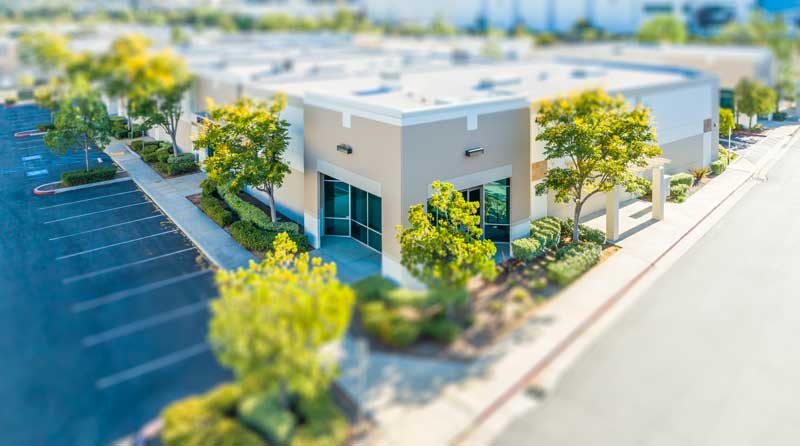
Key Benefits of TPO (Thermoplastic Olefin) Roofing
- Energy Efficiency: TPO roofing is highly reflective, which helps reduce energy costs by reflecting UV rays and minimizing heat absorption. This makes buildings cooler and less reliant on air conditioning.
- Durability: TPO membranes are resistant to tears, punctures, and impact damage. They are also resistant to mold, dirt, and algae, which contributes to their longevity.
- Cost-Effective: Compared to other roofing materials like EPDM and PVC, TPO is generally more affordable both in terms of material and installation costs.
- Flexibility: TPO membranes are flexible, allowing for easier installation on a variety of roof types and shapes. This flexibility also helps accommodate building movement and settling without compromising the integrity of the roof.
- Ease of Installation: TPO roofing systems are typically installed using heat-welded seams, which are faster and more reliable than adhesive or taped seams, resulting in lower labor costs and fewer installation errors.
- Environmentally Friendly: TPO is a recyclable material, and its reflective properties contribute to reducing the urban heat island effect. Many TPO products are also free from chlorine and other harmful chemicals.
- UV and Ozone Resistance: TPO membranes are designed to withstand long-term exposure to UV radiation and ozone, which helps maintain their physical properties and performance over time.
- Fire Resistance: TPO roofing systems can achieve high fire resistance ratings, providing an added level of safety for the building.
- Chemical Resistance: TPO membranes are resistant to many chemicals, including oils, fats, and many industrial pollutants, making them suitable for a variety of applications, including commercial and industrial buildings.
These benefits make TPO roofing a popular choice for many building owners and contractors looking for a reliable, cost-effective, and energy-efficient roofing solution.
I am text block. Click edit button to change this text. Lorem ipsum dolor sit amet, consectetur adipiscing elit. Ut elit tellus, luctus nec ullamcorper mattis, pulvinar dapibus leo.
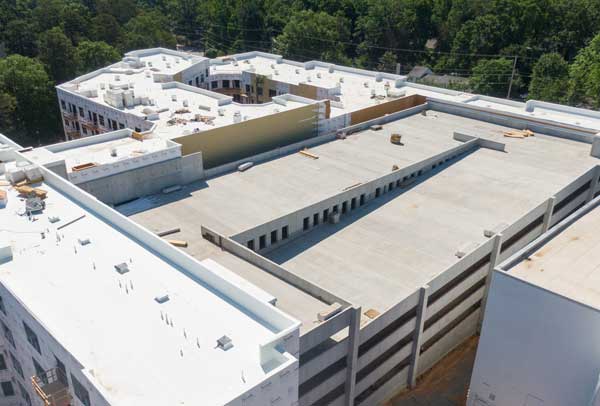
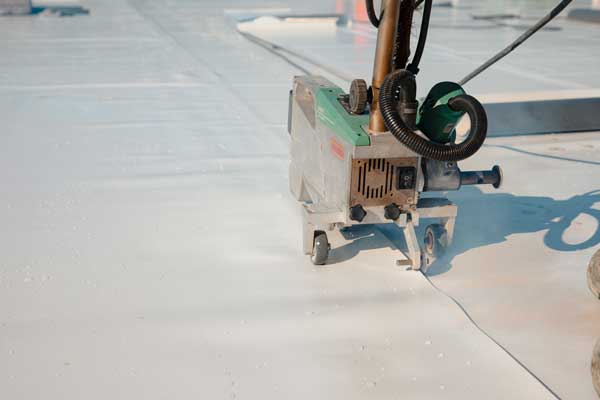
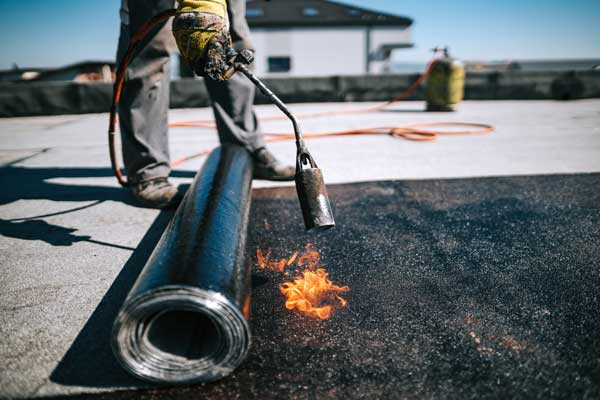
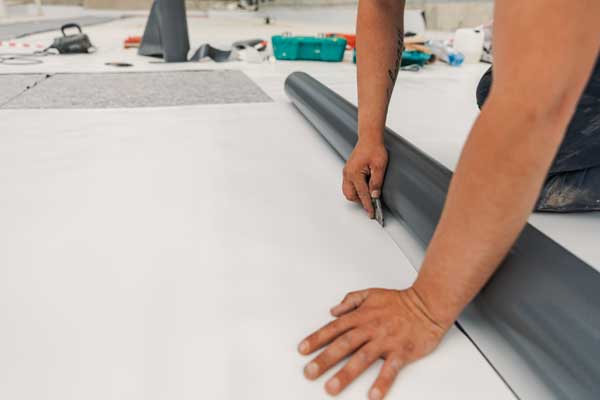
Benefits of Torch Down Roofing:
- Waterproofing: Torch down roofing, made from modified bitumen, provides excellent waterproofing. This is crucial for flat roofs that are prone to water pooling.
- Durability and Weather Resistance: This type of roofing is highly durable and can withstand extreme weather conditions, including heavy rain, strong winds, and snow. It is also resistant to UV rays, which prevents cracking and blistering.
- Seamless Application: The torch down method creates a seamless, fully adhered roof surface, which minimizes the risk of leaks and water infiltration. This is particularly important for large commercial buildings.
- Long Lifespan: Torch down roofs can last 15-20 years or more with proper maintenance, making them a cost-effective long-term solution.
- Fire Resistance: The materials used in torch down roofing are fire-resistant, providing added safety for commercial buildings.
- Flexibility: Like TPO, torch down roofing can accommodate building movement and settling without compromising the integrity of the roof.
Why Commercial Property Owners Should Consider These Options:
- Cost Savings: Both TPO and torch down roofing offer cost savings in terms of installation, maintenance, and energy efficiency. Lower energy bills and fewer repairs mean better long-term financial performance.
- Enhanced Durability: The durability of these roofing options means less frequent replacements and repairs, which is beneficial for budget management and reducing disruptions to business operations.
- Safety and Compliance: Both options provide excellent fire resistance and are compliant with various building codes and regulations, enhancing the safety of commercial properties.
- Versatility: These roofing systems are suitable for a wide range of commercial applications, from retail spaces and office buildings to industrial facilities, thanks to their adaptability and performance in different environments.
- Environmental Impact: With growing emphasis on sustainability, TPO’s recyclable nature and energy efficiency can help property owners meet green building standards and reduce their environmental footprint.
By considering these factors, commercial property owners can make an informed decision that balances cost, performance, and sustainability for their roofing needs.
Top 5 FAQs About TPO Roofing in Los Angeles
What is TPO roofing?
TPO (Thermoplastic Olefin) roofing is a type of single-ply roofing membrane used primarily on commercial buildings. It’s made from a blend of polypropylene and ethylene-propylene rubber, providing a durable, energy-efficient, and environmentally friendly roofing solution. TPO roofing is known for its resistance to UV radiation, chemical exposure, and punctures, making it a popular choice for flat and low-slope roofs.
What are the benefits of TPO roofing?
The benefits of TPO roofing include:
- Energy Efficiency: TPO membranes are highly reflective and can reduce cooling costs by reflecting UV rays and heat.
- Durability: TPO is resistant to tears, impacts, and punctures, and can withstand extreme weather conditions.
- Cost-Effectiveness: It is generally less expensive than other single-ply roofing materials such as EPDM or PVC.
- Ease of Installation: TPO membranes are lightweight and available in wide sheets, which can speed up installation and reduce labor costs.
- Environmental Friendliness: TPO is recyclable and often contains no toxic chemicals, making it an eco-friendly option.
How long does TPO roofing typically last?
The lifespan of a TPO roof can vary depending on the quality of the material, the installation process, and the environmental conditions it faces. On average, a well-installed and maintained TPO roof can last between 15 to 25 years. Advances in TPO technology and improved installation techniques can extend the lifespan even further, with some high-quality TPO roofs lasting up to 30 years.
How is TPO roofing installed?
TPO roofing can be installed using several methods:
- Mechanically Attached: Fasteners are used to secure the membrane to the roof deck.
- Fully Adhered: A bonding adhesive is applied to the roof deck and the back of the TPO membrane, adhering the membrane directly to the substrate.
- Ballasted: The membrane is laid loosely over the roof deck and held in place by a layer of ballast, such as river rock or pavers.
- Heat-Welded Seams: Regardless of the attachment method, the seams of TPO membranes are typically heat-welded, creating a strong, watertight bond.
What maintenance is required for TPO roofing?
Regular maintenance of TPO roofing can help extend its lifespan and ensure optimal performance. Maintenance tasks include:
- Regular Inspections: Conduct semi-annual inspections and after severe weather events to identify and address any damage or potential issues.
- Cleaning: Remove debris and dirt from the roof surface to prevent damage and maintain reflectivity.
- Repairing Seams and Punctures: Promptly repair any damaged seams or punctures to prevent leaks.
- Checking Drainage Systems: Ensure that gutters, drains, and downspouts are clear and functioning properly to avoid water pooling on the roof.
- Reinforcing High-Traffic Areas: Install walkway pads or additional protection in high-traffic areas to prevent wear and tear.
Top 5 FAQs About Torch Down Flat Roofing in Los Angeles
What is torch down roofing?
Torch down roofing, also known as torch-on roofing, is a type of roofing material used for flat or low-slope roofs. It consists of modified bitumen, which is asphalt combined with rubber or plastic additives, and is reinforced with a layer of polyester or fiberglass. The material is applied to the roof using an open flame torch, which melts the bitumen and adheres it to the underlying surface, creating a waterproof seal.
What are the benefits of torch down roofing?
The benefits of torch down roofing include:
- Waterproofing: Torch down roofing provides excellent waterproofing, making it ideal for flat or low-slope roofs prone to water pooling.
- Durability: It is highly durable and resistant to punctures, UV radiation, and weather extremes, including heavy rain, snow, and hail.
- Longevity: A well-installed torch down roof can last 15 to 20 years or more with proper maintenance.
- Low Maintenance: Requires minimal maintenance compared to other flat roofing options.
- Flexibility: The modified bitumen allows the material to expand and contract with temperature changes without cracking.
How is torch down roofing installed?
Torch down roofing is installed in layers using the following steps:
- Preparation: The roof surface is cleaned and primed to ensure proper adhesion.
- Base Layer: A base sheet of modified bitumen is rolled out and secured to the roof deck.
- Torching: The top layer of modified bitumen is rolled out and heated with a propane torch as it is applied. The heat melts the bitumen, creating a bond with the base layer and the roof surface.
- Sealing Seams: Seams and overlaps are carefully torched and sealed to ensure a watertight barrier.
- Inspection: The roof is inspected for proper adhesion and to ensure there are no gaps or weak spots.
What are the safety considerations for installing torch down roofing?
Safety considerations for installing torch down roofing include:
- Fire Risk: The open flame torch poses a fire risk. Installers must take precautions to prevent accidental fires, such as having fire extinguishers on hand and ensuring the work area is clear of flammable materials.
- Training: Installers should be properly trained in the use of torches and the installation process to ensure safety and quality workmanship.
- Protective Gear: Workers should wear protective gear, including gloves, safety glasses, and long-sleeved clothing, to protect against burns and other injuries.
- Weather Conditions: Avoid installation during high winds or rain, as these conditions can increase the risk of accidents and negatively affect the installation process.
What maintenance is required for torch down roofing?
Regular maintenance of torch down roofing can help extend its lifespan and maintain its performance. Maintenance tasks include:
- Regular Inspections: Conduct inspections at least twice a year and after major weather events to identify any damage or potential issues.
- Cleaning: Remove debris, leaves, and dirt from the roof surface to prevent blockages in drainage systems and reduce the risk of water pooling.
- Repairing Damage: Promptly repair any cracks, blisters, or punctures in the roofing material to prevent leaks and further damage.
- Seam Maintenance: Check seams and overlaps for signs of wear or separation and reseal if necessary to maintain a watertight barrier.
- Checking Flashing: Inspect flashing around roof penetrations, such as vents and chimneys, to ensure it is secure and in good condition.
